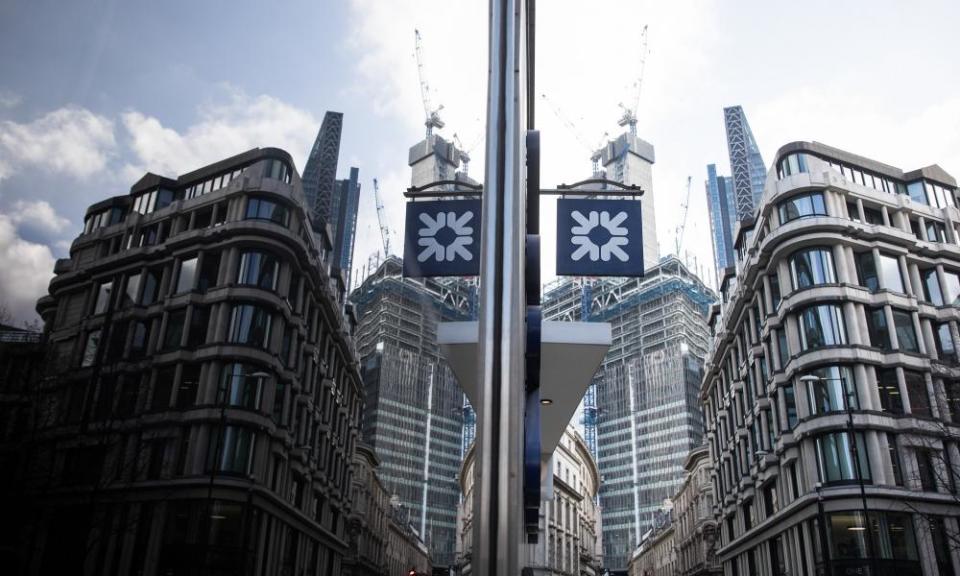No FCA action against RBS after mistreatment of small businesses

The City watchdog is to take no disciplinary action against Royal Bank of Scotland over the mistreatment of small business customers struggling after the banking crisis.
The Financial Conduct Authority said it lacked the powers to discipline RBS for misconduct, despite the “widespread inappropriate treatment” of up to 12,000 small businesses by the bank’s global restructuring group (GRG) between 2008 and 2013.
An internal memo written in 2009 by GRG advised its staff that “sometimes you have to let customers hang themselves” when in financial difficulty, adding that “missed opportunities will mean missed bonuses”. RBS has said the memo did not reflect bank policy or guidance.
Andrew Bailey, the FCA’s chief executive, said: “I appreciate that many GRG customers will be frustrated by this decision, but we have explored all the options available to us before arriving at this conclusion.
“The fact that we can’t take action in no way condones the behaviour of RBS. We expect high standards from the firms we regulate and RBS fell well short in its treatment of GRG customers.”
Nicky Morgan, the Conservative MP who chairs the Treasury select committee, said: “It will be disappointing and bewildering for those who got caught up in GRG’s actions that the FCA is not able to act. This demonstrates the need for a change in how lending for SMEs [small- and medium-sized enterprises] is regulated.
“The government should stand ready to introduce any legislation required when it sees the outcome of current reports on redress and should also urgently consider what additional powers the FCA requires to act in cases such as GRG.”
In February, Morgan’s committee published the City watchdog’s full unredacted report into what the committee called RBS’s disgraceful treatment of small firms that came to the bank for financial assistance after the banking crisis. The group of MPs released the complete report after a protracted standoff with the FCA, which had published only a redacted version.
Commissioned by the FCA in 2014, the report said GRG’s activities had resulted in material financial distress for small business customers. Some said they were pushed into bankruptcy.
One of them is Nigel Henderson, who ran a hotel business with his wife, Norma, with annual profits of around £500,000 in the late 1990s. He claims GRG, then called specialised lending services, drove the business into bankruptcy and seized all the couple’s personal assets. They now live in a rented house and rely on their state pensions and housing benefit.
Pointing to Iceland and the Republic of Ireland, where some bank bosses have been jailed for their role during the financial crisis, Henderson said: “I just don’t believe there was any will by the [UK] authorities to bring the bankers to book … The government have got to get a grip.”
The Hendersons cannot claim compensation under the complaints process overseen by Sir William Blackburne, a retired high court judge, because it only applies to cases from 2008.
Bailey said companies that had experienced loss as a result of how they were treated while in GRG must be appropriately compensated, and that the FCA was closely monitoring the complaints process.
The RBS GRG Business Action Group, which represents hundreds of affected small businesses and is pursuing a legal claim on their behalf, said: “We are disappointed but not surprised by today’s announcement. The FCA has always been a supine, toothless regulator, more concerned with protecting RBS than ordinary people. It will not stop us in the pursuit of justice through our high court claim.”
Bailey said while commercial lending to SMEs was not regulated by the FCA, the watchdog now had the power to hold senior management of banks to account for the way they treat their small business customers, with powers to fine them under rules that came into force in 2016.
But the FCA said it could not apply the new powers retrospectively. It also said it found no evidence of dishonesty or lack of integrity, and argued that it could not bring a successful case for lack of competence against senior management.
Bailey said: “It is important to recognise that the business of GRG was largely unregulated and the FCA’s powers to take action in such circumstances, even where the mistreatment of customers has been identified and accepted, are very limited.
“Taking action was therefore always going to be difficult and challenging but after carefully considering all the evidence we have concluded that our powers to discipline for misconduct do not apply and that an action in relation to senior management for lack of fitness and propriety would not have reasonable prospects of success.”
Howard Davies, the chairman of RBS, said: “The board welcomes the FCA’s confirmation that it has concluded its investigation into the bank and that no further action will be taken. We await the publication of the FCA’s full account and will reflect carefully on its findings to learn any further lessons from what was a hugely challenging time for the bank, its customers and the wider economy.
“The board continues to focus on putting things right for customers through our complaints process and ensuring that past mistakes cannot be repeated. The way the bank deals with business customers in financial difficulty is fundamentally different now.”

 Yahoo Finance
Yahoo Finance 